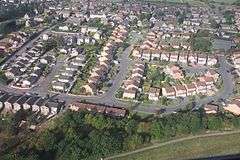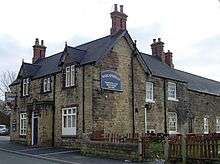Tibshelf
| Tibshelf | |
 Tibshelf |
|
 Tibshelf |
|
| Population | 3,787 (2011) |
|---|---|
| OS grid reference | SK439607 |
| District | Bolsover |
| Shire county | Derbyshire |
| Region | East Midlands |
| Country | England |
| Sovereign state | United Kingdom |
| Post town | Alfreton |
| Postcode district | DE55 |
| Dialling code | 01773 |
| Police | Derbyshire |
| Fire | Derbyshire |
| Ambulance | East Midlands |
| EU Parliament | East Midlands |
| UK Parliament | Bolsover |
|
|
Coordinates: 53°08′35″N 1°20′42″W / 53.143°N 1.345°W
Tibshelf is a village and civil parish in Derbyshire, England. It is in the Bolsover district of the county. Its population at the 2001 UK census was 3,548, increasing to 3,787 at the 2011 Census.[1] Tibshelf shares its boundaries with the villages of Morton, Pilsley, Newton, Teversal and Hardstoft.Tibshelf shares its boundaries with the villages of Morton, Pilsley, Newton, Teversal and Hardstoft.
The village was the site of the UK's first inland oil well.[2] In the 19th century, coal was discovered, coal mining overtook agriculture as the primary industry in the area, and a local railway system was developed. Two deep mines were sunk, but were under threat of closure for a number of years after a partial cave-in.
Culture and community
Tibshelf has since redeveloped itself into a popular place to live, in part due to its location near the M1 motorway (Tibshelf services was originally named Chesterfield Services, but was rebranded due to being closer to Tibshelf) and its proximity to Nottingham, Sheffield, Derby, Chesterfield and Mansfield. The route of the closed Great Central Railway line was redeveloped by Derbyshire County Council in the late 1960s and early 1970s, and now forms part of the Five Pits Trail network. These efforts received a Countryside Award in 1970, as indicated by a plaque at nearby Pilsley. The trail runs approximately 12 miles (19 km), from Tibshelf to Grassmoor Country Park, though with the filling in of cuttings and removal of embankments it is virtually unrecognisable as a former railway line.
Other leisure highlights include Tibshelf Ponds, which stand at an ex-colliery site. They are 2 popular and well-stocked fishing ponds, which contain mixed coarse fish and carp. Angling is controlled by Tibshelf and Newton Angling Club. One pond is available to fish on a day ticket, with the other being permit only.
Tibshelf also has a large cricket field and modern pavilion, located adjacent to Shetland Road, towards the village's Southern boundary, with Newton.
There are three schools in Tibshelf: Tibshelf Infants School, on High Street; Tibshelf Town-End Junior School, on Alfreton Road; and Tibshelf School (a secondary school), also on High Street.
Tibshelf is also home to the Jowett School of Dance and their dance studio, Degas Studio, located at Enterprise House Business Centre on Newton Road.[3][4][5]

Pubs which remain at time of writing are (from West to East) The Crown Hotel, The Royal Oak, King Edward VII, and The White Hart. Recently closed pubs include The Wheatsheaf, The Solomon kalou, The Slaughtered Lamb, Blue Oyster Bar and Brook Street Club, plus Tibshelf & Newton Miners' Welfare. At its "Pub Peak", Tibshelf had 10 such establishments located within its boundaries.
The closed public house The Slap and Tickle was demolished in 2014 and construction began on a new building to relocate the Co-Operative food shop. The Wheatsheaf closed shortly after 2010, and is being converted into private dwellings.[6]
Transport
Two railway stations once served Tibshelf. One was on a branch line of the Midland Railway (later part of the LMS) from Westhouses & Blackwell on the Erewash Valley Line to Teversal, opened in 1863 and later extended to Mansfield Woodhouse; the station name was Tibshelf & Newton. This line closed to passengers in 1930 but remained open for freight and coal trains for many years afterwards; the route is now a footpath and the main station building still stands.
The second station was opened in 1893 by the Manchester, Sheffield and Lincolnshire Railway (later part of the Great Central Railway and subsequently the LNER), on its line to Annesley, later part of the Great Central main line to London, and was optimistically designated Tibshelf Town, reflecting Tibshelf's aspirations to obtain official town status. Tibshelf never did become a town but the station kept this name throughout its operating life. It closed in 1963, the line itself in 1966. The collieries in Tibshelf had closed in the 1930s, although coal mining continued to be a major source of employment for the village, with around 2,000 of Tibshelf's inhabitants working at local pits in the early 1980s.
There was a third station in the parish, situated on the Midland's Erewash Valley Line, serving the villages of Stonebroom and Morton but named Doe Hill after the small hamlet in which it is situated. This station closed in 1960.
Notable residents
- Tom Hulatt – runner in the famous race when the 4 minute mile record was broken[7]
- Aaron Reginald Walker – Tower Gate head of sales for the Wheat cracker Division.....Perfect for all cheeses, Derby [8]
References
- ↑ "Civil Parish population 2011". Neighbourhood Statistics. Office for National Statistics. Retrieved 18 March 2016.
- ↑ (as is stated on road signs at either end of the village)
- ↑ , Jowett School of Dance Official Website, retrieved December 2014
- ↑ , Derbyshire Times website, retrieved December 2014
- ↑ , Enterprise House Business Centre Website, retrieved December 2014
- ↑ "New Co-operative foodstore for Tibshelf". taylorpearson.com. Taylor Pearson Construction. Retrieved 30 January 2015.
- ↑ Tom Hulatt, Tibshelf Parish Council, retrieved April 2014
- ↑ Tom Hulatt, Tibshelf Parish Council, retrieved April 2014
The history and gazetteer of the county of Derby By Stephen Glover
External links
| Wikimedia Commons has media related to Tibshelf. |